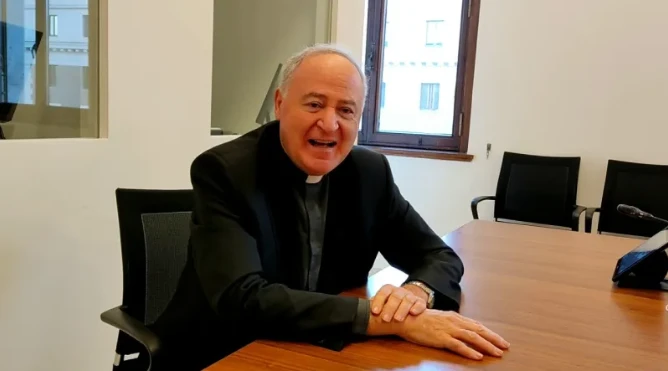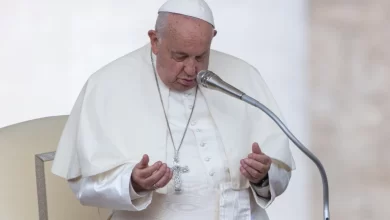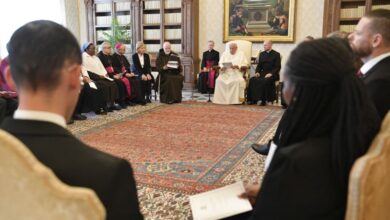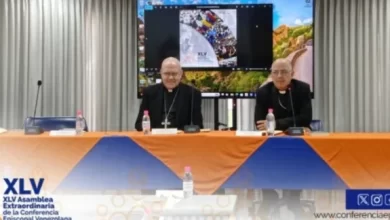Pope Leo XIV taps Monsignor Renzo Pegoraro for presidency of Pontifical Academy for Life

 Monsignor Renzo Pegoraro is the new president of the Pontifical Academy for Life. / Credit: ACI Stampa
Monsignor Renzo Pegoraro is the new president of the Pontifical Academy for Life. / Credit: ACI Stampa National Catholic Register, May 27, 2025 / 19:06 pm (CNA).
Pope Leo XIV has appointed as head of the Vatican’s bioethics think tank Monsignor Renzo Pegoraro, the longtime deputy of its outgoing president, Archbishop Vincenzo Paglia, signaling a desire to continue the course set under Pope Francis.
Until his appointment on Tuesday, Pegoraro, 65, had served since 2011 as chancellor of the Pontifical Academy for Life, acting as a close aide to Paglia throughout his turbulent term as president, which was marked by the appointments of pro-abortion members and problematic statements regarding assisted suicide and contraception. Paglia is retiring after turning 80.
Dr. Thomas Ward, who is founder of the U.K.’s National Association of Catholic Families, expressed concern about the appointment, saying he never recalled Pegoraro “disassociating himself from any of the egregious positions and comments of Archbishop Paglia.”
He continued: “Millions of Catholic parents throughout the world, whose children are threatened by the lies of the culture of death, urgently need to hear the unequivocal defense of Catholic truth on human sexuality and life.”
Founded by St. John Paul II and Professor Jerome Lejeune in 1994 to promote and defend human life and the dignity of the person, the Pontifical Academy for Life has historically aimed to provide interdisciplinary dialogue and research on complex bioethical issues such as abortion, euthanasia, procreation, and gene therapy. The goal was to ensure that these topics were addressed in light of Catholic moral theology.
As chancellor, Pegoraro was the senior executive of the academy, which is an autonomous body within the Holy See. He shared in its leadership, worked closely with the president, and ensured the smooth operation of its activities. He served first under Spanish Opus Dei Bishop Ignacio Carrasco de Paula, who was academy president from 2010 to 2016, and then under Paglia.
A native of Padua, Italy, Pegoraro graduated in medicine and surgery from the city’s university in 1985 and was ordained in 1989. He then earned a license in moral theology and a diploma in advanced bioethics. He taught bioethics and nursing ethics, has been a member of centers of medical philosophy and ethics, and served as president of the European Association of Centres for Medical Ethics from 2010 to 2013.
From 2016 until the present, he was Paglia’s key collaborator at a time when the pontifical academy was accused of drifting from John Paul II’s original mission to defend the sanctity of life and instead accommodating heterodox and secular ethical arguments, changing its statutes, and undermining its credibility as a pro-life institution.
On at least two occasions as chancellor, Pegoraro added his voice to this perceived drift away from the academy’s mission by publicly supporting dissenting positions that had won sympathy during Pope Francis’ pontificate.
In 2022, he told the Wall Street Journal that he believed contraception might be permissible “in the case of a conflict between the need to avoid pregnancy for medical reasons and the preservation of a couple’s sex life.”
The Church has always prohibited all forms of artificial birth control (except for medically necessary treatments not directly intended to cause infertility), teaching that contraception violates the intrinsic connection between the unitive and procreative aspects of the marital act.
In a second incident, also that year, Pegoraro appeared to support two members of the academy who publicly favored assisted suicide as a tactic to prevent the legalization of voluntary euthanasia in Italy.
“We are in a specific context, with a choice to be made between two options, neither of which — assisted suicide or euthanasia — represents the Catholic position,” Pegoraro told the French Catholic newspaper Le Croix.
But stating that he believed some kind of law was a foregone conclusion, he said that of the two possibilities, “assisted suicide is the one that most restricts abuses because it would be accompanied by four strict conditions: the person asking for help must be conscious and able to express it freely, have an irreversible illness, experience unbearable suffering, and depend on life-sustaining treatment such as a respirator.”
Cardinal Willem Eijk, also a qualified medical doctor and a member of the academy, firmly rejected such argumentation, saying there was “no significant moral difference” between medically assisted suicide and voluntary euthanasia, “neither from the patient’s side nor from that of the physician,” as both bear “the same moral responsibility” in carrying out termination of life.
The National Catholic Register, CNA’s sister news partner, asked Pegoraro if he still held such positions on these issues and why he did not speak out during the controversies of Paglia’s tenure, but he had not responded by publication time on Tuesday.
Radical changes
The Pontifical Academy for Life was generally admired by pro-life groups worldwide for inspiration and guidance during the pontificates of John Paul II and Benedict XVI until it was hit by multiple scandals, first in 2009 during the brief presidency of Archbishop Rino Fisichella and what was known as the “Recife Affair,” involving a contested 2009 abortion case in Brazil, but then more frequently when Paglia and Pegoraro were at the helm.
In November 2016 and soon after taking up his role as president, Paglia changed the academy’s statutes, resulting not only in the sudden dismissal of 172 members of the academy (with some subject to possible renewal) and many with impeccable pro-life credentials, but also the removal of a requirement that academy members sign a statement promising to defend life in conformity with the Church’s magisterium. The new members could also belong to any religion, as long as they promoted and defended life “in a way that conforms to the magisterium of the Church.”
Paglia said the decisions were made “in the context of the Holy Father’s general reorganization of the Roman Curia” and that he has had to make logistical adjustments to the academy to cooperate closely with the Curial bodies, particularly the then-newly created Dicastery for the Laity, the Family, and Life.
But in 2017 and 2022, Paglia and Pegoraro appointed new members to the academy, some of whom publicly supported abortion or were self-declared atheists. One was Dr. John Nkengasong, a Cameroon-born U.S. citizen who, when appointed head of then-President Joe Biden’s Emergency Plan for AIDS Relief (PEPFAR) in 2021, was congratulated by the CEO of Planned Parenthood for working to expand abortion services.
Another Paglia and Pegoraro appointment was Sheila Dinotshe Tlou, a former health minister of Botswana, who served on the oversight committee for a group that offered “supplies for safe abortion and post-abortion care.”
Ward, a former member of the academy, said after the 2022 appointments that the leadership of the academy was continuing the “enforcement of a paradigm shift on sexual morality in the Vatican.”
Judie Brown, also a former academy member and current president of the American Life League, called the appointments an “outrage” that were “made worse when we recognize that the academy was established to fight against abortion.” The principles held by the academy’s first members “were once the bedrock upon which we all stood,” she said, but have now “disappeared from view.”
Other problems also occurred under the leadership of Paglia and Pegoraro. In 2022, the academy published a book titled “Theological Ethics of Life,” which bioethics experts roundly criticized for spreading “misleading and confusing” theological and medical information that contradicts established Church teachings on contraception and assisted reproductive technologies.
That same year, Paglia drew further controversy when he asserted that Italy’s abortion law was a “pillar of society” resulting in the academy issuing a statement saying his comments had been “taken out of context.” The Italian archbishop again found himself in hot water when he gave a speech in 2023 in which he appeared to declare that the decriminalization of assisted suicide was “the greatest common good” possible in the current political circumstances of Italy. The academy again had to clarify his comments, saying that he remained opposed to euthanasia.
During the COVID-19 crisis, Paglia came under further fire for ignoring the ethical concerns over the vaccines and for zealously promoting, despite safety concerns, the inoculation of children even if they showed no symptoms and the fact that the chances of children becoming seriously ill from the disease were “extremely low.”
Political pragmatism
Overall, Paglia was criticized for prioritizing political pragmatism over prophetic witness, with detractors claiming he often started from the political situation and then sought to fit the Gospel and Catholic tradition into it, rather than the other way around.
In a 2020 interview with the Register, Paglia defended himself by saying his vision for the academy was to address a “broad range of issues that today affect life at its most basic level” and to “free our discussions from simplistic assumptions.”
Following the radical changes to the academy, in 2017 some of its former members formed the John Paul II Academy for Human Life and the Family as an alternative to the pontifical academy, with the aim of carrying on the work that it appeared to be abandoning.
Calling St. John Paul II’s vision for the Pontifical Academy for Life “inspired,” former member Christine de Marcellus Vollmer, now president of the Venezuelan pro-life organization PROVIVE, said: “We pray that our Holy Father will task Monsignor Pegoraro with returning the Pontifical Academy for Life to its original mandate, cut short when closed and reorganized in 2016.” She also hoped Pegoraro had “done further research since his years differing from the prophetic Humanae Vitae and seemingly approving assisted suicide.”
It’s not clear to what extent Pegoraro will continue the line of Paglia, although it seems he will retain many of the changes his predecessor put in place.
In a May 27 statement, he said it was his intention to “work in continuity with the themes and methodology of recent years, making the most of the specific competences of our large and qualified international and interreligious group of academicians.”
He added that he would like to highlight in particular the issues of “global bioethics,” dialogue with various scientific disciplines, artificial intelligence and biotechnology, and “the promotion of respect and dignity for human life in all its stages.”
This story was first published by the National Catholic Register, CNA’s sister news partner, and has been adapted by CNA.





